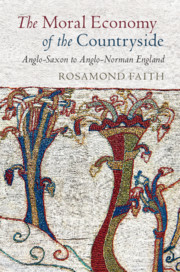The Moral Economy of the Countryside Anglo-Saxon to Anglo-Norman England
Langue : Anglais
Auteur : Faith Rosamond

Shows the 'moral economy' of early medieval England transformed by 'feudal thinking' in the aftermath of the Norman Conquest.
How were manorial lords in the twelfth and thirteenth century able to appropriate peasant labour? And what does this reveal about the changing attitudes and values of medieval England? Considering these questions from the perspective of the 'moral economy', the web of shared values within a society, Rosamond Faith offers a penetrating portrait of a changing world. Anglo-Saxon lords were powerful in many ways but their power did not stem directly from their ownership of land. The values of early medieval England - principally those of rank, reciprocity and worth - were shared across society. The Norman Conquest brought in new attitudes both to land and to the relationship between lords and peasants, and the Domesday Book conveyed the novel concept of 'tenure'. The new 'feudal thinking' permeated all relationships concerned with land: peasant farmers were now manorial tenants, owing labour and rent. Many people looked back to better days.
1. Introduction: the moral economy; Part I. Rank: 2. Lordship; 3. Our island story; 4. Honour and respect in peasant society; Part II. Reciprocity: 5. Hospitality; 6. Hearth, household and farm; Part III. Reputation and Witness: 7. Neighbours and strangers; 8. Markets and marketing; Part IV. The Wolf Sniffs the Wind: 9. HWILOM WÆS: Archbishop Wulfstan's old social order; 10. Land, law and office; Part V. The Aftermath of Conquest: 11. New words in the countryside; 12. Narrating the new social order; Part VI. In the World of the Manor: 13. Establishing custom; 14. Thinking feudally; 15. From rank to class; 16. Conclusion: forward into the past; Appendix. The family farm in peasant studies; Bibliography; Index.
Rosamond Faith is author of The English Peasantry and the Growth of Lordship (1997) and co-author, with Debby Banham, of Anglo-Saxon Farms and Farming (2014). Her research has focused on peasant families and farms in medieval Provence and England, and on the nature of lordship, peasant resistance and how medieval people managed the different landscapes they lived in.
Date de parution : 10-2019
Ouvrage de 244 p.
15.7x23.5 cm
Date de parution : 10-2019
Ouvrage de 244 p.
15.4x22.8 cm
Thème de The Moral Economy of the Countryside :
© 2024 LAVOISIER S.A.S.



